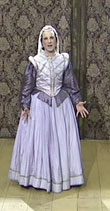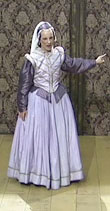- Edition: King Leir
King Leir
- Introduction
- Texts of this edition
- Contextual materials
- Facsimiles
170King Leir, Scene 25
Cast
Ragan: Derek Genova
The Queen's Men and Shakespeare (Sc. 25)
171Read about the Queen's Men and Shakespeare in Scene 24
Powerful women forced to act through the agency of men are familiar figures in early modern theatre and Ragan's monologue is an early example of this trope. This speech has a close connection not to Shakespeare's King Lear but to Macbeth. Ragan's wish that she were "made a man" (TLN 2371) is reminiscent of Lady Macbeth's call for the "Spirits,/That tend on mortal thoughts" to "unsex" her (![]() F: 391-2) and perhaps more specifically to Beatrice who does express a desire to be a man (
F: 391-2) and perhaps more specifically to Beatrice who does express a desire to be a man (![]() F: 1968-9) rather than Lady Macbeth's more ambiguous wish to be unsexed.
F: 1968-9) rather than Lady Macbeth's more ambiguous wish to be unsexed.
Read more about the Queen's Men and Shakespeare.
Performing Ragan (Sc. 25)
172Read about performing Ragan in Scene 22
Derek enjoyed the opportunity this monologue offered him to deepen his connection with his character as she reveals her anxieties and the depth of her wickedness. Because he was alone on stage, I encouraged him to direct his final threat to the audience, warning any man therein who "repines" at her to keep clear of her "hands" for fear of violence (TLN 2386-2387). Ragan and Gonorill are both a challenging representation of womanhood and the actors took every opportunity they could to provoke responses from the audience.
Read more about performing Ragan.
Queen's Men Politics (Sc. 25)
173The play's interest in women's agency is a sign of pressing concerns arising within early modern society. For any conservative patriarchs in the audience, Ragan might be easily defined as an example of the corruptible and corrupting female sex and the play certainly presents her in such a negative light, but the presence of the company's female patron on the throne of England might encourage us to imagine more complex responses. Ragan's desire for freedom to act is so eloquently expressed in the lines: "Oh, God, that I had been but made a man,/Or that my strength were equal with my will" (TLN 2371-2). How did the company expect their audience to respond? Is it our 21st century perspective that leads us to sympathize with the villainess at this point or would she have found similarly receptive members of her own audience? In our production, our commitment to the preservation of historical distance led to a more negative depiction of Ragan relying on a relatively simple interpretation of patriarchal dogma but at moments like this, it became clear that the issues were more complex and open to a multiplicity of responses. Genova (Ragan) used this moment as a source of motivation for his character's actions throughout the play.
Read more about the Queen's Men politics
Watch video of Scene 25 on the Performing the Queen's Men website. (The video footage is password protected. Click on "Cancel" in the pop-up window to obtain password.)



